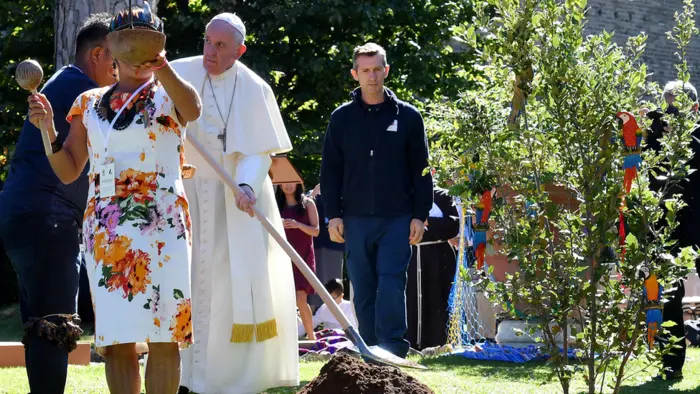The intersection between ecology and spirituality has been a topic of growing interest in recent decades, as environmental awareness increases and concerns about the future of the planet intensify.
Adverts
Many religious and spiritual traditions offer a rich source of insights and practices related to nature preservation and environmental responsibility.
In this text, we will examine how different spiritual traditions approach issues such as sustainability, conservation, and environmental responsibility, highlighting their unique perspectives and contributions to the contemporary discussion about the environment.
Furthermore, the convergence between ecology and spirituality reflects a paradigm shift in the way human beings relate to the natural world.
As we recognize the interdependence of all life forms and become aware of the impacts of our actions on the environment, there is a growing need for a holistic approach that integrates spiritual and ethical considerations with practical solutions to environmental challenges.
Spiritual traditions offer a philosophical and moral foundation that can inspire and inform concrete actions toward a more harmonious coexistence with nature.
This intersection also highlights the importance of interreligious and intercultural dialogue in the search for sustainable solutions. By recognizing and valuing diverse spiritual perspectives on the environment, we can find common ground and areas of collaboration to address global environmental challenges more effectively and inclusively.
Buddhism: The Interconnectedness of All Things
This perspective offers a solid philosophical basis for environmental ethics, encouraging practitioners to consider the repercussions of their actions on the environment and to adopt a more conscious and sustainable lifestyle.
In Buddhism, the practice of meditation also plays a significant role in awareness and connection with nature.
Through meditation, practitioners can develop greater sensitivity to natural patterns and cycles of life, thereby cultivating a deep respect for the interconnectedness of all life forms.
Additionally, many Buddhist monks are active in promoting nature conservation and protecting wild areas as part of their spiritual practice.
They frequently engage in reforestation, natural habitat conservation and environmental education projects, recognizing the vital importance of preserving ecological integrity for the well-being of all creatures.
Through their efforts, Buddhist monks not only contribute to the protection of the environment, but also inspire others to follow suit, thus promoting a culture of respect and care for the Earth.
Christianity: Man as Caretaker of Divine Creation
In Christianity, the doctrine of creation teaches that God created the world and entrusted human beings with the responsibility of caring for his creation.
Although some theological interpretations have historically encouraged an anthropocentric view of the natural world, there is increasingly an emphasis on the human responsibility to protect and preserve the environment as an act of obedience to God and love for others.
Many Christian communities are engaging in sustainability practices such as recycling, energy conservation and protection of natural habitats as expressions of their faith and commitment to caring for divine creation.
Furthermore, Christian religious leaders have played a significant role in addressing environmental issues at global levels, urging believers and religious institutions to take an active role in protecting the environment.
Documents such as Pope Francis' papal encyclical “Laudato Si'” have drawn attention to the environmental crisis and emphasized the moral responsibility of all human beings to care for the Earth and its natural resources.
These efforts have inspired many Christians to integrate environmental considerations into their spiritual practices and to engage in environmental justice initiatives in their communities and beyond.
This paradigm shift within Christianity reflects a broader understanding of the connection between spirituality and ecology, recognizing that care for creation is a fundamental expression of the Christian faith.
As more individuals and religious communities embrace an environmental ethic based on spiritual values, there is renewed hope that we can work together to preserve and protect the natural world for future generations.
Hinduism: Ecology and Nature as Divinity
In Hinduism, nature is considered sacred and divine, and many of its ancient texts describe the earth as a manifestation of the divine. The connection between man and nature is seen as intrinsic and interdependent, with respect and reverence for natural life being fundamental to spiritual practice.
From this understanding emerges an environmental ethic deeply rooted in the principles of “ahimsa” (non-violence) and “dharma” (moral duty).
The principle of “ahimsa” is fundamental in Hinduism and extends not only to human beings, but to all forms of life.
This concept inspires believers to adopt a compassionate approach to the environment, avoiding causing unnecessary harm to living things and seeking ways to minimize ecological suffering.
Through the practice of “ahimsa”, Hindus are encouraged to live in harmony with all forms of life, recognizing the interconnectedness and interdependence of all beings.

Furthermore, the concept of “dharma” drives Hindus to act in accordance with their moral duty towards the environment.
This involves understanding that each individual has a responsibility to care for and preserve nature, ensuring that natural resources are used in a responsible and sustainable way.
“Dharma” teachings emphasize the importance of acting for the benefit of the entire community and the environment as a whole, rather than seeking only personal benefit.
Islam: The concept of Stewardship and Balance
Furthermore, Islam promotes the notion that human beings should be humble towards nature and recognize their position as an integral part of the world created by Allah. This humility implies respecting and caring for the earth and all its creatures as a form of worship and gratitude to the Creator.
The emphasis on moderation and simplicity is also an essential part of Islamic environmental ethics, encouraging the faithful to avoid waste and excessive consumption, and to live in balance with available natural resources.
Furthermore, many Islamic teachings emphasize the importance of acting for the common good and social justice, which includes protecting the environment and providing equitable access to its resources.
Therefore, environmental responsibility in Islam goes beyond individual care for nature; it also encompasses the promotion of equity and justice in the distribution and use of natural resources.
This ensures that all communities have access to the benefits provided by the natural environment, in accordance with the principles of justice and solidarity fundamental to the Islamic faith.
Indigenous Spirituality: Harmony with Ecology
Indigenous spiritual traditions around the world not only share a vision of interconnectedness and deep respect for the earth and its creatures, but also embody a deep reverence for ancestral wisdom and knowledge passed down from generation to generation.
These cultures often emphasize the importance of listening to and learning from the teachings of nature, recognizing it as a source of spiritual guidance and inspiration.
For many indigenous communities, rituals and ceremonies are opportunities to honor this sacred connection to the land, offering gratitude for its gifts and seeking guidance for living in balance and harmony.
Indigenous wisdom also highlights the importance of respecting natural cycles and biodiversity as fundamental to the health and well-being of all forms of life.
Many indigenous practices and traditions reflect this commitment to ecology as the preservation of the land and its resources, including sustainable agricultural methods, natural resource management techniques, and environmental protection rituals.
Furthermore, many indigenous communities are at the forefront of the fight for environmental protection, defending their territories against exploitation and destruction by extractive industries and promoting conservation practices based on respect for the land and its inhabitants.
Conclusion
Ecology and spirituality are two lenses through which we can understand and respond to the environmental challenges facing our world. Religious perspectives on the environment offer valuable insights and inspiration for concrete action toward sustainability and conservation.
By exploring diverse spiritual traditions and their approaches to environmental issues, we can cultivate a deeper understanding of our interconnectedness with nature and a renewed commitment to caring for and protecting the Earth we share.




